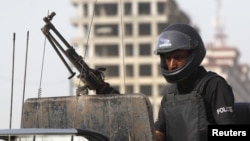A senior Islamic State (IS) militant commander was killed by security forces in Pakistan, police said on Thursday, further underscoring what analysts say is an emerging IS threat.
Mushtaq Meher, the deputy Inspector General of police in Pakistan’s southern coastal city of Karachi, told reporters that Kamran Aslam, also known as Kamran Gujjar, was killed in a police raid in Karachi’s Ettihad Town neighborhood.
Police also seized an automatic rifle, three grenades and explosives materials, Meher said.
A 2.5 million Pakistani rupees (around $24,000) reward was being offered for his capture. Aslam was an IS-trained militant, and he was formerly associated with al-Qaida’s sub-continent branch, Meher said.
“He had recently joined (IS),” said Meher, adding that Aslam had a long association with al-Qaida and the Taliban.
Long rap sheet
The police chief said Aslam had been involved in a number of terror activities in Pakistan.
Aslam carried out deadly attacks against police and Rangers’ forces in Karachi and Hyderabad, a police statement said. Around 40 policemen have been killed in the attacks.
Aslam had also been involved in bank robberies and attacks on media outlets in Pakistan, the statement added.
“He was planning to target several political and important federal government figures,” Meher told reporters about Aslam’s would-be terror activities. “He was involved in 30 to 40 (terror) cases,”
Signs of IS recruiting in Pakistan
Islamabad has consistently denied that IS has a presence in the country.
But recent IS activities and statements by high-level Pakistani officials strengthen the fear that the terror group may have been successful in making recruiting inroads in a nation ripe for militant activities, analysts say.
IS has been active in some parts of Pakistan since 2014 when a group of 15 Pakistani Taliban members, including their spokesperson, Shahidullah Shahid pledged allegiance to IS leader Abu Bakr al-Baghdadi, according to news reports.
Pakistan’s Intelligence Bureau Chief, Aftab Sultan, last month warned that IS is an emerging threat in the country and that hundreds of fighters linked to local banned religious groups left for Syria in recent months to join IS ranks there.
In addition to using several Pakistani banned outfits that “have a soft corner for IS” for recruitment and carrying out its activities in the country, the terror group has also been actively attempting to lure educated Pakistanis into its ranks, analysts and reporters say.
Luring ‘critical mass’
The group is particularly courting university students and business professionals, including doctors, journalists, lawyers, and businessmen, The Associated Press reported earlier this month.
“A critical mass of educated people is joining them (IS),” Pakistani security analyst Huma Baqai told VOA.
IS recruiters recently attempted to lure a Pakistani journalist, Hassan Abdullah, into IS ranks, AP reported.
The IS group has also recruited a large number of women who have been actively recruiting and fundraising for the group in several cities of Pakistan, including Karachi.
“Their women wings (groups) are working, collecting money,” Baqai told VOA.
Top counterterrorism police official in Karachi, Raja Umer Khitab, told AP that a women's network at an educational academy in Karachi recruited female students by playing IS videos in classrooms. The students then reached out to middle-class and wealthy Karachi women for financial support.
Some Pakistan-based analysts say IS has been able to establish a footprint in the country.
“If we accept that IS does not have an organizational structure in Pakistan, we would be deceiving ourselves,” political analyst Ayesha Siddiqa told VOA, referring to a statement by the country’s interior minister that IS did not have a “hierarchy” in Pakistan.




